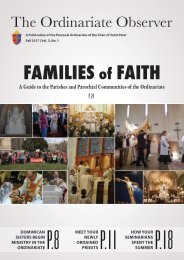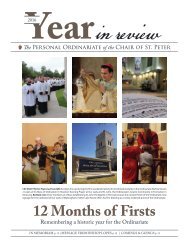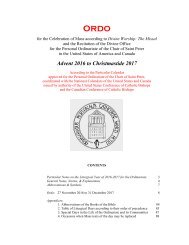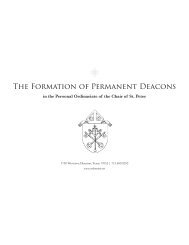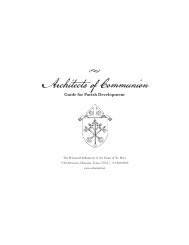1701_OCSP_Pastoral_Letter
Read "A Pledged Troth," Bishop Steven J. Lopes' Pastoral Letter on Amoris Laetitia.
Read "A Pledged Troth," Bishop Steven J. Lopes' Pastoral Letter on Amoris Laetitia.
Create successful ePaper yourself
Turn your PDF publications into a flip-book with our unique Google optimized e-Paper software.
fostered by the law of God.… This shared progress<br />
demands reflection, instruction and suitable<br />
education … to assist married people in their human<br />
and spiritual progress, a progress that demands<br />
awareness of sin, a sincere commitment to observe<br />
the moral law, and the ministry of reconciliation.” 60<br />
The Church accompanies as Teacher and Mother,<br />
confident that with the grace and assistance of God,<br />
conscience can “remain ever open to new stages of<br />
growth and to new decisions which can enable the<br />
ideal to be more fully realized.” 61<br />
The formation of conscience “can include the help of<br />
the sacraments,” including reconciliation and, under<br />
certain conditions, the Eucharist. 62 As the Church<br />
teaches, and has always and firmly maintained,<br />
because reception of the Eucharist is the reception<br />
of Christ himself, “anyone conscious of a grave sin<br />
must receive the sacrament of Reconciliation before<br />
coming to communion.” 63 St.<br />
Paul cautioned that “anyone<br />
who eats and drinks unworthily,<br />
without discerning the body<br />
of the Lord, eats and drinks<br />
judgment upon himself ” (1<br />
Cor. 11:29), as Pope St. John<br />
Paul II reaffirmed: “in the<br />
Church there remains in force,<br />
now and in the future, the rule<br />
by which the Council of Trent<br />
gave concrete expression to the<br />
Apostle Paul's stern warning<br />
when it affirmed that, in order<br />
to receive the Eucharist in a worthy manner, ‘one<br />
must first confess one's sins, when one is aware of<br />
mortal sin.’” 64<br />
Under the guidance of their pastor, avoiding<br />
occasions of confusion or scandal, divorced and<br />
civilly remarried persons may receive the Eucharist,<br />
on the condition that when “for serious reasons,<br />
such as for example the children’s upbringing, a<br />
man and woman cannot satisfy the obligation to<br />
separate, they ‘take on themselves the duty to live<br />
in complete continence, that is, by abstinence from<br />
the acts proper to married couples.’” 65 A civilly<br />
60 Ibid.<br />
61 Amoris Laetitia, 303.<br />
62 Ibid., n. 351; cf. n. 336.<br />
“The Church<br />
accompanies as Teacher<br />
and Mother, confident<br />
that with the grace<br />
and assistance of God,<br />
conscience can remain<br />
ever open to new stages<br />
of growth.”<br />
remarried couple, if committed to complete continence,<br />
could have the Eucharist available to them, after<br />
proper discernment with their pastor and making<br />
recourse to the sacrament of reconciliation. Such a<br />
couple may experience continence as difficult, and<br />
they may sometimes fail, in which case they are, like<br />
any Christian, to repent, confess their sins, and begin<br />
anew.<br />
Reconciliation requires contrition, the “sorrow<br />
of the soul and detestation for the sin committed,<br />
together with the resolution not to sin again.” 66 A<br />
civilly remarried couple firmly resolving complete<br />
chastity thus resolves not to sin again, which differs<br />
in kind from a civilly remarried couple who do not<br />
firmly intend to live chastely, however much they<br />
may feel sorrow for the failure of their first marriage.<br />
In this situation, they either do not acknowledge that<br />
their unchastity, which is adultery, is gravely wrong,<br />
or they do not firmly intend<br />
to avoid sin. In either case,<br />
the disposition required for<br />
reconciliation is not satisfied,<br />
and they would receive the<br />
Eucharist in a condition of<br />
grave sin. Unless and until<br />
the civilly remarried honestly<br />
intend to refrain from sexual<br />
relations entirely, sacramental<br />
discipline does not allow for the<br />
reception of the Eucharist.<br />
The firm intention for a chaste<br />
life is difficult, but chastity is<br />
possible, and it “can be followed with the help of<br />
grace.” 67 Every person is called to chastity, whether<br />
married or not, and the assistance of grace and the<br />
tenderness of mercy is available to all. Further the law<br />
is given to us by a kind and loving God: “Since the<br />
moral order reveals and sets forth the plan of God the<br />
Creator, for this reason it cannot be something that<br />
harms man, something impersonal. On the contrary,<br />
by responding to the deepest demands of the human<br />
being created by God, it places itself at the service<br />
of that person’s full humanity with the delicate and<br />
binding love whereby God himself inspires, sustains<br />
and guides every creature towards its happiness.” 68<br />
God orders us to our happiness and well-being, he<br />
commands only what is for our goodness, and he<br />
never abandons us in our weakness and need.<br />
14<br />
63 Catechism of the Catholic Church, 1385.<br />
64 John Paul II, Ecclesia de Eucharistia, 36.<br />
65 John Paul II, Familiaris Consortio, 84; citing Homily at the Close of the Sixth Synod of<br />
Bishops (Oct. 25, 1980), 7.<br />
66 Catechism of the Catholic Church, 1451; citing Council of Trent, 1676.<br />
67 Amoris Laetitia, 295.<br />
68 John Paul II, Familiaris Consortio, 34.




